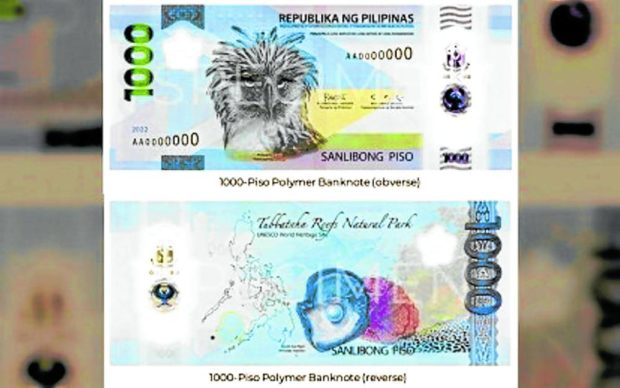Farmers hit BSP for ‘psychological impact’ of polymer banknotes shift

1,000-peso polymer banknote. (Photo from BSP)
MANILA, Philippines — The Bangko Sentral ng Pilipinas’ (BSP) bid to shift to polymer in making banknotes has a “psychological impact” on local farmers, said the Federation of Free Farmers (FFF).
FFF chairman Leonardo Montemayor lamented the negative repercussions of the BSP-initiated shift to polymer banknotes at the Senate committee on banks, financial institutions and currencies hearing on Wednesday to investigate the frequent changes in the country’s banknotes and coins.
READ: Some senators prefer banknotes made of abaca not polymer
“This has an impact in terms of our poverty picture – availability of jobs, income for rural residents, and also, in addition to that, it’s the psychological impact. Our farmers feel that the abaca industry, which the Philippines has always been proud of, is now being belittled,” Montemayor said in a mix of Filipino and English.
He pointed out that about 400 farmers across 56 provinces are engaged in the abaca industry. Catanduanes is the top abaca-producing province, Montemayor said.
“Instead of showing support, the Bangko Sentral, which is tasked to protect and give importance to our currency, is number one in pushing aside abaca and favoring polymer as the basic raw material,” he fumed.
Article continues after this advertisementMontemayor added: “It’s not just the farmers but in general, I would say, even the many sectors in agriculture are psychologically affected and disheartened by this.”
Article continues after this advertisementEarlier, he also questioned the constitutionality of the BSP’s bid to shift to polymer banknotes, citing Section 12, Article 12 of the 1987 Constitution, which urges the state to “promote the preferential use of Filipino labor, domestic materials, and locally produced goods, and adopt measures that help make them competitive.”
Montemayor argued that the material change for banknotes “is contrary to the President [Ferdinand Marcos Jr.]’s own pronouncements, emphasizing agriculture and pushing for our own domestic capacity to provide, as much as possible, for our own needs vis-à-vis relying on the importation, in this case, of plastic raw materials for our polymer peso bills.”
Responding to this, BSP senior assistant governor and general counsel Elmore Capule asserted that they had considered all aspects.
READ: Polymer bank notes: World trend meets critics in PH
“We have to realize that constitutional provisions are not self-executory. […] As far as the BSP is concerned, we are cognizant of these provisions. Meaning, we cannot just make a decision based on, let’s say, a particular sector or industry. We look at the entire economy, the entire impact, and the savings, which is good for all,” he explained.
Capule noted that the push for a switch to polymer banknotes is “experimental at this stage,” but he later defended that this decision was greenlit by then President Rodrigo Duterte.
READ: Duterte leads presentation of P1,000 polymer banknotes
The BSP started circulating the new P1,000 polymer banknotes last April.